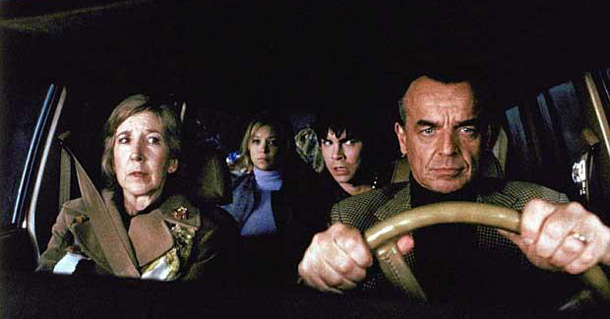I first saw Dead End years ago, in the earliest days of my Netflix streaming subscription, and then it promptly disappeared from existence, at least so far as I could tell. Last week, I discovered it had resurfaced on Tubi. Its icon instantly brought a wave of nostalgia for the days when streaming services seemed both narrower and deeper, inviting you to pan through their mysteries at random until you came up with nuggets of gold.
Jean-Baptiste Andrea and Fabrice Canepa’s Dead End is at least silver. It plays out like a supersized and unusually vulgar Twilight Zone episode, and audiences will figure out what is going on well before the characters do. Possibly even immediately. That’s not necessarily a flaw, however: some plots, in life and movie, can only unfold inevitably.
The always-welcome Ray Wise plays Frank Harrington, a tightly wound man driving his mostly ill-tempered family–frazzled wife, obnoxious teenage son, buttoned-up social-worker-in-training daughter, and daughter’s earnest boyfriend–to Christmas with his in-laws. The car is cramped, and almost everyone is in a bad mood. Frank decides to take a shortcut through a wooded area, something you should never do if there’s even the faintest chance you might be in a horror movie, and it’s such an unbroken stretch of quiet, dark road that he starts to doze off. He narrowly avoids running smack into another car, and then strange things start happening. No matter how long they drive, they can’t get out of the woods. The landscape repeats itself. The family is periodically visited by an ethereally creepy woman in white, whose every appearance seems to result in one of their party getting killed, kidnapped, or both. The bodies pile up, secrets get revealed, and everyone starts losing their minds.
It’s a standard tale, and what really makes it memorable is the movie’s dark humor, at least once it figures out how to properly lean into it. (Early on, the Harringtons feel like a heavy-handed satire of an unpleasant family, and that angle is handled less effectively; it’s a relief when they start getting more sympathetic moments.) It has a mean but perversely likable frankness about all the effects of all the unlovely gore and horror it’s miring its characters in, resulting in situations where people stress-gobble entire pies and characters repeatedly prod a dead body with a stick to try to get a cell phone out the corpse’s pocket. And, of course, they snipe at each other. To the extent that the film engages with your emotions, it sets up a warring tension between whether or not adversity will band the dwindling Harringtons together or widen the fractures in their already-strained relationships. Both seem possible, and the movie manages to make it feel like the outcome matters, even though we may already suspect certain foregone conclusions.
Dead End is streaming on Tubi.


